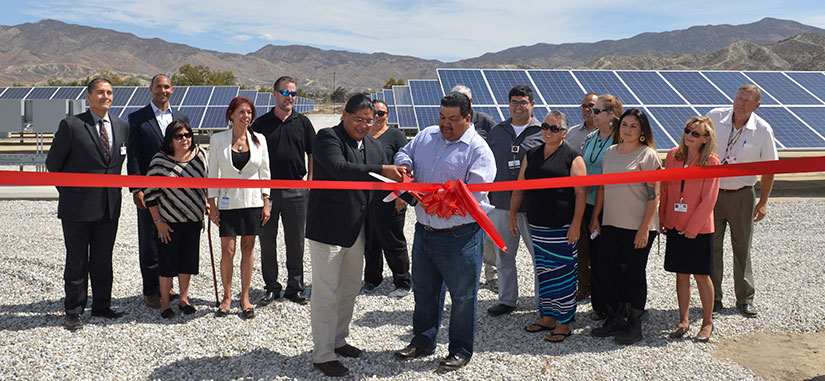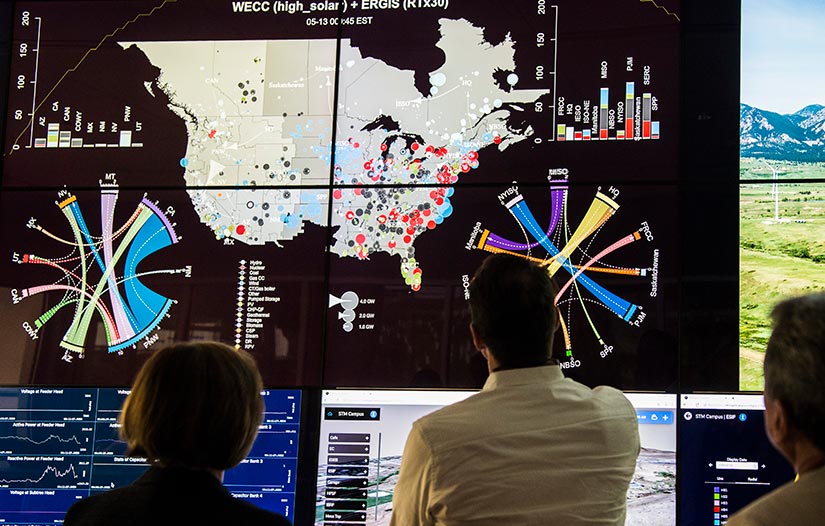Accelerating Clean Energy at Scale
Accelerating Clean Energy at Scale (ACES) helps translate community energy ambitions into actions.

To move from energy ambitions to actions, communities need in-depth energy-sector expertise and insight. As a U.S. Department of Energy (DOE) research lab, NREL offers unbiased, best-in-class analysis and modeling capabilities supported by decades of scientific and applied research, expertise, and partnerships. We support a vision for rapid, widespread transition to clean, affordable, equitable, secure, and resilient energy systems.
The Path to an Equitable Energy Future
As an objective, noncommercial convener of energy leaders, NREL has helped more than 2,000 Tribes, communities—many of which are historically underserved—utilities, and businesses advance their clean energy goals with support from a broad range of private- and public-sector sponsors.
Rooted in inclusive community engagement, ACES brings together NREL’s experience, expertise, and capabilities to illuminate pathways for clean, affordable, equitable, secure, and resilient energy systems. Through customized, holistic modeling and analysis, we uncover insights and collaboratively develop strategies that address communities’ unique energy-system goals and diverse stakeholder priorities. NREL provides support in evaluating and implementing community-selected options, as well as assistance for workforce development.
As NREL supports communities in completing energy transitions, we leverage best practices and proven methodologies to enable more communities to achieve their clean energy goals, quickly and effectively. We can scale this agile approach to support diverse and wide-ranging energy goals and transitions—in small communities to regional collaboratives—building momentum toward a national equitable, clean energy future.
Energy transitions benefit millions of Americans by:
- Boosting local economies
- Increasing energy security and affordability
- Advancing environmental equity
- Reducing emissions
- Building energy system resilience.
Working Together for Success
The foundation of energy transition planning is engagement—understanding the perspectives, challenges, and priorities of communities, utilities, investors, and other community members. This collaboration informs data-driven, technically sound actionable options addressing communities' unique energy-system goals and diverse priorities, including:
- Partnership opportunities
- Investment strategies
- Technology possibilities and scenarios
- Energy equity considerations
- Illustration of trade-offs—through modeling and visualization.
ACES provides support—including workforce development—to implement community-selected options, developing partnerships and leveraging public and private funds to enable infrastructure and other investments. Communities benefit from NREL's understanding of the complex dynamics of energy sector planning and implementation decisions, as well as the experience, networks, and models of successful programs and initiatives such as Wind Powering America, Clean Cities, the Solar Energy Innovation Network, Energy Transitions Initiative, Innovation Incubator, and the Energy Executive Leadership Academy, and others.

From Energy Ambitions to Actions
Leading U.S. jurisdictions and companies continue to reach out to NREL to help advance their economic, environmental, and engineering initiatives. We apply learnings from these clean energy pioneers and customize and scale the ACES approach to fit the unique needs of communities and businesses.
City of Los Angeles
In support of the city’s goal to reach reliable, 100% renewable energy by 2045, NREL provided rigorous analysis and technology expertise to inform decision-making toward economic growth, energy security, and equitable access to clean electricity resources. See the Los Angeles 100% Renewable Energy Study.
Font du Lac Band of Lake Superior Chippewa
Members worked with NREL to understand the economics of individual energy projects, leading to a broader plan and positioning the Tribe as a regional leader in energy and air quality issues. See Fond du Lac Band Poised to Double 2020 Clean Energy Goal on the DOE website.
New York
Leaders turned to NREL for a neutral analysis of options to achieve a bold goal of 100% carbon-free electricity by 2040 and economy-wide, net-zero carbon emissions by 2050. NREL also supported New York and New Jersey after Hurricane Sandy by integrating energy efficiency, sustainability, and renewable energy measures into recovery efforts.
The city of Kingston, New York, partnered with NREL and a foundation to explore equity-centered pathways to increase resilience and job opportunities in achieving their 100% clean energy goals.
Colorado
In Denver, NREL developed foundational software that integrates building energy load modeling with distribution system modeling to enable Colorado’s first microgrid on a zero-energy campus at Peña Station NEXT.
Publications
Accelerating Clean Energy @ Scale, NREL Fact Sheet (2021)
NREL Supports Kingston, New York, in Building a Community-First Approach to 100% Renewable Energy, NREL Fact Sheet (2020)
Unprecedented Analysis of LA's Clean Energy Transformation, NREL Fact Sheet (2020)
Partnerships
ACES partnerships leverage experience and networks from successful models such as:
Solar Energy Innovation Network
DOE Energy Transitions Initiative and the Energy Transitions Initiative Partnerships Project
Energy Executive Leadership Academy.
Contact
Share

